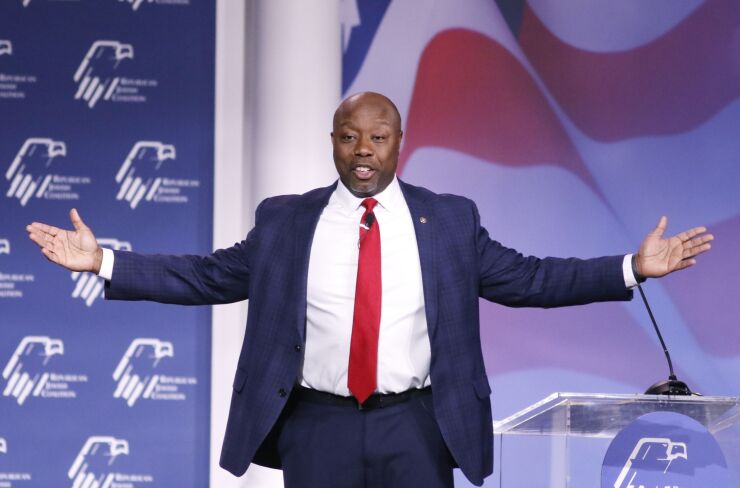WASHINGTON — Lawmakers and expert witnesses tried to suss out what would happen to other financial regulatory agencies should the Supreme Court rule that the Consumer Financial Protection Bureau's funding mechanism is unconstitutional.
A number of Democratic lawmakers have raised concerns that other financial regulatory agencies, including the Fed, could face inadvertent consequences from the
At a hearing of the House Financial Services Subcommittee on Financial Institutions and Monetary Policy, Rep. Andy Barr, R-Ky., asked witnesses to address the "sky is falling" concerns that the Supreme Court case could undermine the constitutionality of other self-funding banking regulators.

Barr, yesterday,
Some of the Republican-called witnesses appeared to agree that the Supreme Court case would call into question the validity of other self-funded agencies.
Devin Watkins, an attorney at the Competitive Enterprise Institute, said in his opening testimony that the Supreme Court decision could leave other agencies, including the Fed, OCC, FDIC, NCUA, the Office of Financial Research and the Federal Housing Finance Agency, open to challenges. He recommended that Congress pass conditional appropriations to guarantee those agencies' operations in the event that the Supreme Court rules the CFPB's funding mechanism unconstitutional.
"There are other agencies out there that do have nonappropriated funds and Congress should review those as well, and think about how to return those agencies to the congressionally funded appropriations process as well," he said in response to Barr's question.
Brian Johnson, managing director at Patomak Global Partners LLC and former deputy director of the CFPB under Trump-appointee to the agency Kathy Kraninger, likened the CFPB more to regulators like the Securities and Exchange Commission and the Commodity Futures Trading Commission, and said that its funding should be considered differently than prudential regulators such as the Fed and the FDIC.
"Fundamentally, the CFPB is in a different situation than the FDIC, the NCUA, the Fed and the OCC as each of those agencies has been assigned by Congress a safety and soundness mission — in other words, they're prudential regulators," he said. "And they provide a service to banks in the form of guaranteed liabilities — in terms of liability insurance, in terms of deposit insurance — and they supervise institutions for safety and soundness to guard against the risk to taxpayers."
The CFPB, meanwhile, is "fundamentally a market conduct regulator," he said.
"It may be appropriate for Congress to establish funding structures for [prudential] agencies to recoup the cost of that supervision from the banking institutions that are supervised by those agencies," Johnson said. "Fundamentally, the Bureau has no obligation to ensure the continued operation of institutions as an ongoing concern. It is simply there to supervise institutions for compliance with a discrete set of federal consumer financial laws. So market conduct is distinct from prudential regulation. And it's a fundamental difference that I think should be accounted for."

Rep. Bill Foster, D-Ill., the ranking member on the subcommittee, disagreed with what he described as a "tortured attempt to separate safety and soundness from consumer protection."
"I think you're wrong in that, actually, the CFPB provides a service to all actors in the financial system to protect them from competition from bad actors," he said. "That's a service that our financial system has come to depend on."





